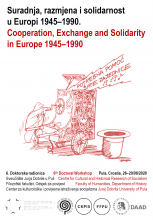CfA: Los sistemas políticos latinoamericanos y caribeños ante la nueva ola de movilizaciones y protestas sociales
El año 2019 mostró de forma relativamente inesperada un resurgimiento de manifestaciones masivas en América Latina y el Caribe que comenzaron enfrentando decisiones de los gobiernos y luego se mantuvieron en las calles sosteniendo conflictos de gran intensidad e incierto desenlace.
Postponement of seminar AFHMT-SISLAV
[Original post about this seminar: https://socialhistoryportal.org/news/articles/310096]
Cher·e·s collègues et amie·s,
CfP: From Cooperativism to Commoning. Historical and Contemporary Forms of the Institutions of the Common
International Conference
University of Warsaw
19—20 November 2020
Cooperation – Economically Organized Democracy
CfA: Director of the Research Department - European Trade Union Institute
The European Trade Union Institute (ETUI) is a non-for-profit organisation (www.etui.org) located in Brussels.
CfP: Digital work: more autonomy or a new subjugation of work?
The last two decades have seen profound transformations of work, both in the process of work organisation and in the functioning of the labour market. Among these, the most recent and fastest is the computerisation of work, in particular the digitisation of work. A new frontier has thus opened up in the field of work and, at the same time, in the exploitation and precarisation of work, which the current health and social-economic crisis is widening out of all proportion.
CfP: Writing the History of Political Graffiti. Graphic rebellion and the appropriation of public space (19th – 21st century)
[French version here: https://calenda.org/772094]
“We erase them (it’s not easy), we arrest graffiti artists and put them in prison, we ban the sale of markers or spray cans – nothing will do, they make their own and start again every night.”1
Archivo Histórico de Revistas Argentinas
El Archivo Histórico de Revistas Argentinas (AhiRa) agrupa a docentes e investigadores de distintas disciplinas —letras, historia, ciencias de la comunicación—, interesados en el estudio de la prensa, las revistas culturales y las publicaciones periódicas en diálogo con los debates estéticos, políticos e ideológicos de la historia cultural argentina.
CfP: 6th Doctoral Workshop: Cooperation, Exchange and Solidarity in Europe 1945-1990
https://www.unipu.hr/ckpis/en/doctoral_workshop/2020
Although in special circumstances due to the pandemic, even this year we are trying to organise the Doctoral Workshop. We hope the conditions will be safe and favourable, and that we will be able to gather as usually, in Pula at the end of summer. All possible changes in schedule will be announced on time. We defined this year's theme in September last year, but right now, unfortunately, it is becoming more current.

